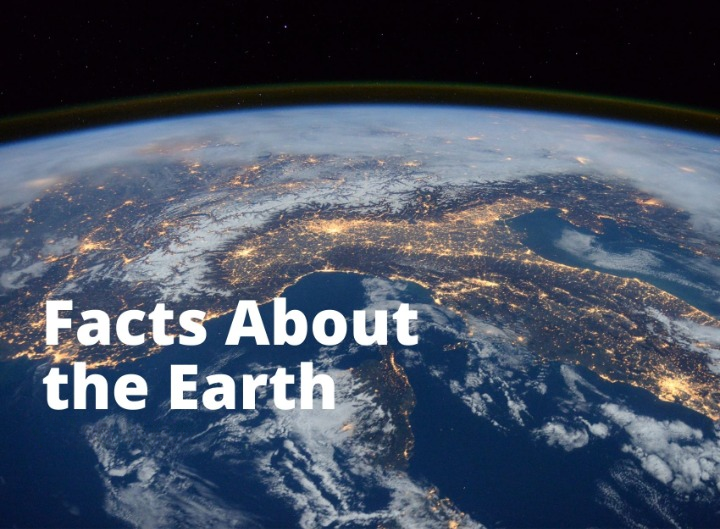Welcome to our ultimate guide on 10 amazing facts about Earth. As the only known planet in the universe that sustains life, Earth is a fascinating subject for exploration and study. In this article, we will take you on a journey through the marvels of our planet, from its formation to its present-day wonders. Get ready to be amazed by some of the most interesting facts about earth!
amazing facts about earth :-

1. Earth is 4.54 billion years old
earth is an ancient planet, and its age is estimated to be about 4.54 billion years old. Over this vast period of time, our planet has gone through many changes and transformations, from the formation of its first continents to the evolution of complex life forms.
2. Earth is the densest planet in the solar system
Did You Know Did you know that earth is the densest planet in the solar system? Its average density is around 5.52 grams per cubic centimeter, which is almost twice the density of the next most dense planet, Venus. This high density is due to the presence of heavy elements like iron and nickel in Earth’s core.
3. Earth has a powerful magnetic field
Earth has a magnetic field that is generated by its core. The magnetic field protects the planet from the solar wind, a stream of charged particles that flow from the Sun. The magnetic field also helps to create the auroras, also known as the Northern and Southern Lights.
4. Earth has a complex system of tectonic plates
Another amazing fact about earth is its complex system of plate tectonics. The movement of these massive plates of rock is responsible for many of the planet’s features, including mountains, volcanoes, and earthquakes. Plate tectonics also play a role in the carbon cycle and the regulation of Earth’s climate.
5. Earth’s atmosphere is a delicate balance
Earth’s atmosphere is a complex system that is essential for life as we know it. It is made up of a mixture of gases, including nitrogen, oxygen, and carbon dioxide, among others. The atmosphere helps to regulate Earth’s temperature, protects us from harmful radiation, and plays a critical role in the water cycle.
6. Earth has a unique system of ocean currents
Earth’s ocean currents are an important part of the planet’s climate system. These currents are driven by a combination of wind, temperature, and salinity, and they help to distribute heat and nutrients around the globe. The Gulf Stream, for example, is a powerful ocean current that helps to warm the eastern coast of North America and Western Europe.
7. Earth’s Atmosphere Is Vital for Life
Earth’s atmosphere is a thin layer of gases that surround the planet, extending up to an altitude of about 10,000 kilometers. It contains oxygen, which is essential for the survival of all living organisms, and it protects us from harmful solar radiation.
8. Earth has a natural satellite: the Moon
Earth’s only natural satellite is the Moon, which is the fifth largest moon in the solar system. The Moon has played an important role in shaping Earth’s history, from the tides it creates to the role it played in the formation of our planet’s atmosphere.
9. Earth is a blue planet
From space, earth appears as a striking blue sphere. This is due to the high percentage of water on our planet’s surface – around 71% of Earth’s surface is covered in water. This water is essential for life and plays a critical role in Earth’s climate
10. Earth is constantly changing
Finally, one of the most amazing facts about earth is that it is constantly changing. From the movement of tectonic plates to the evolution of life, our planet is a dynamic and ever-evolving system. Human activity is also playing an increasingly significant role in shaping Earth’s future, from climate change to pollution.
11. Earth has a lot of water
Water is one of the most important substances on earth, and our planet has a lot of it. In fact, more than 70% of the Earth’s surface is covered by water, and the oceans contain about 97% of the Earth’s water. This water is essential for life, and it plays a crucial role in many of Earth’s systems, including the climate, the water cycle, and the formation of landforms.
12. Earth’s atmosphere is essential for life
The Earth’s atmosphere is a crucial component of our planet’s habitability. It is composed of a mix of gases that provide us with the air we breathe, protect us from harmful radiation, and help to regulate the temperature of our planet. Without the atmosphere, life on earth would be impossible.
13. Earth is the perfect distance from the sun
Another amazing fact about earth is its perfect distance from the sun. This distance, known as the “habitable zone,” allows our planet to maintain the right temperature for liquid water and a stable climate. It also allows for the development and maintenance of life on our planet.
14. Earth is a rare and unique planet
Finally, the most amazing fact about earth is that it is a rare and unique planet. In a vast and largely inhospitable universe, our planet is a haven for life and a testament to the incredible power of nature. It is up to us to protect and preserve this incredible planet for generations to come.
15. Earth Is Not a Perfect Sphere
Contrary to popular belief, Earth is not a perfect sphere. It is slightly flattened at the poles and bulges at the equator due to its rotation. This shape is known as an oblate spheroid. do you know these facts.
Checkout more links : TOP 10 BEST PLACES TO VISIT IN MARCH IN INDIA
FAQs:
- How did Earth get its name?
The name “Earth” is derived from the Old English word “ertha,” which means “ground” or “soil.” The name was likely chosen due to the planet’s association with the material world and the land we live on.
- What is the hottest place on Earth?
The hottest place on Earth is the (Lut) Desert in Iran, where temperatures have been recorded as high as 159.3 degrees Fahrenheit (70.7 degrees Celsius).
- How long does it take for the Earth to orbit the sun?
It takes the Earth approximately 365.25 days to orbit the sun, which is why we have a leap year every four years to keep our calendars in sync.
- How deep is the deepest part of the ocean?
The deepest part of the ocean is the Challenger Deep in the Mariana Trench, which reaches a depth of 36,070 feet (10,994 meters).
- Can humans survive in space?
While humans can survive for short periods of time in space, long-term space travel is still a major challenge. Astronauts must contend with a variety of health risks, including radiation exposure, muscle and bone loss, and the psychological challenges of isolation.
- Can life exist on other planets?
It is possible that life exists on other planets, but so far, no conclusive evidence has been found.
Conclusion:
In conclusion, Earth is a remarkable planet that is full of wonders and mysteries. From its formation to its present-day features, Earth is a complex and ever-changing system that continues to amaze and inspire us. Whether you are interested in geology, astronomy, or biology, there is always something new to learn about our amazing planet. We hope this guide has helped you to gain a deeper appreciation for the many amazing facts about earth.

